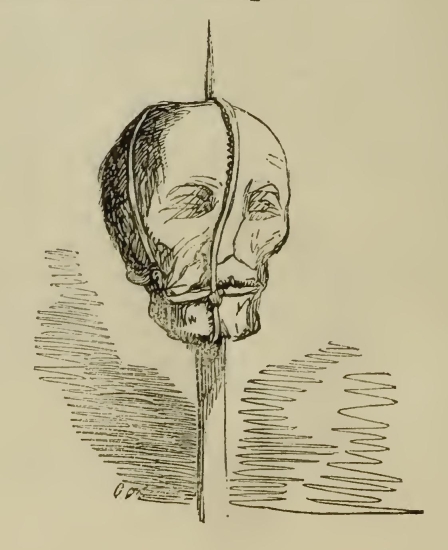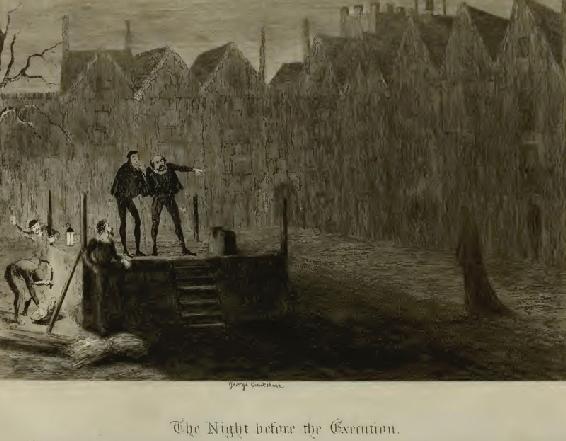
After the forcible abduction of Sir Narcissus by his spouse, the party broke up,—Og and Gog shaping their course to the By-ward Tower, Magog and his spouse, together with Ribald, who had taken up his quarters with them, to their lodging on the hill leading to the Green,—Hairun to the Lions’ Tower, Win-wike and his son to the Flint Tower, while Mauger, Wolfytt, and Sorrocold proceeded to the Cradle Tower. Unfastening his door, the headsman struck a light, and setting fire to a lamp, motioned the others to a bench, and placed a stone jar of strong waters before them, of which Wolfytt took a long, deep pull, but the chirurgeon declined it.
“I have had enough,” he said. “Besides, I want to see the spirit.”
“I care for no other spirit but this,” rejoined Wolfytt, again applying his mouth to the jar.
“Take care of yourselves, masters,” observed Mauger. “I must attend to business.”
“Never mind us,” laughed Wolfytt, observing the executioner take up an axe, and after examining its edge, begin to sharpen it, “grind away.”
“This is for Lord Guilford Dudley,” remarked Mauger, as he turned the wheel with his foot. “I shall need two axes to-morrow.”
“Sharp work,” observed Wolfytt, with a detestable grin.
“You would think so were I to try one on you,” retorted Mauger. “Ay, now it will do,” he added laying aside the implement, and taking up another. “This is my favourite axe. I can make sure work with it. I always keep it for queens or dames of high degree—he! he! This notch, which I can never grind away, was made by the old Countess of Salisbury, that I told you about. It was a terrible sight to see her white hair dabbled with blood. Poor Lady Jane won’t give me so much trouble, I’ll be sworn. She’ll die like a lamb.”
“Ay, ay,” muttered Sorrocold. “God send her a speedy death!”
“She’s sure of it with me,” returned Mauger, “so you may rest easy on that score.” And as he turned the grindstone quickly round, drawing sparks from the steel, he chaunted; as hoarsely as a raven, the following ditty:—
The axe was sharp, and heavy as lead,
As it touched the neck, off went the head!
Wh i r—wh i r—wh i r—wh i r!
And the screaming of the grindstone formed an appropriate accompaniment to the melody.
Queen Anne laid her white throat upon the block,
Quietly waiting the fatal shock;
The axe it severed it right in twain,
And so quick—so true—that she felt no pain!
Whir—whir—whir—whir!
And he again set the wheel in motion.
Salisbury’s countess, she would not die
As a proud dame should—decorously.
Lifting my axe, I split her skull,
And the edge since then has been notched and dull.
Whir—tvhir—whir—whir!
Queen Catherine Howard gave me a fee,—
A chain of gold—to die easily:
And her costly present she did not rue,
For I touched her head, and away it flew!
Whir—whir—whir—whir!
“A brave song, and well sung,” cried Wolfytt, approvingly. “Have you any more of it?”
“No,” replied Mauger, significantly. “I shall make another verse to-morrow. My axe is now as sharp as a razor,” he added, feeling its edge. “Suppose we go to the scaffold? It must be up by this time.”,
“With all my heart,” replied Sorrocold, whose superstitious curiosity was fully awakened.
Shouldering the heavy block with the greatest ease, Mauger directed Wolfytt to bring a bundle of straw from a heap in the corner, and extinguishing the lamp, set forth. It was a sharp, frosty night, and the hard ground rang beneath their footsteps. There was no moon, but the stars twinkled brightly down, revealing every object with sufficient distinctness. As they passed Saint Thomas’s Tower, Wolfytt laughingly pointed out Bret’s head stuck upon a spike on the roof, and observed,—“That poor fellow made Xit a knight.”


On reaching the Green, they found Manger’s conjecture right—the scaffold was nearly finished. Two carpenters were at work upon it, nailing the planks to the posts, and the noise of their hammers resounded in sharp echoes from the surrounding habitations. Hurrying forward, Mauger ascended the steps, which were placed on the north, opposite Saint Peter’s chapel, and deposited his burthen on the platform. He was followed more leisurely by Sorrocold; and Wolfytt, throwing the straw upon the ground, scrambled after them as well as he could.
“If I had thought it was so sold, I would have taken another pull at the stone bottle,” he said, rubbing his hands.
“Warm yourself by helping the carpenter,” replied Sorrocold gravely. “It will do you more good.”
Wolfytt laughed, and dropping on his knees, grasped the block with both hands, and placed his neck in the hollowed space.
“Shall I try whether I can take your head off?” demanded Mauger, feigning to draw his dagger.
Apprehensive that the jest might be carried a little too far, Wolfytt got up, and imitated, as well as his drunken condition would allow, the actions of a person addressing the multitude and preparing for execution. In bowing to receive the blessing of the priest, he missed his footing a second time, and rolled off the scaffold. He did not attempt to ascend again, but supported himself against one of the posts near the carpenters. Mauger and Sorrocold took no notice of him, but began to converse in an under tone about the apparition. In spite of himself, the executioner could not repress a feeling of dread, and the chirurgeon half-repented his curiosity.
After a while, neither spoke, and Sorrocold’s teeth chattered, partly with cold, partly with terror. Nothing broke the deathlike silence around, except the noise of the hammer, and ever and anon, a sullen and ominous roar proceeding from the direction of the Lions’ Tower.
“Do you think it will appear?” inquired Sorrocold, whose blood ran cold at the latter awful sounds.
“I know not,” replied Mauger—“All! there—there it is.” And he pointed towards the church porch, from which a figure, robed in white, but unsubstantial almost as the mist, suddenly issued. It glided noiselessly along, and without turning its face towards the beholders. No one saw it except Mauger and Sorrocold, who followed its course with their eyes. The carpenters continued their work, and Wolfytt stared at his companions in stupid and inebriate wonderment. After making the complete circuit of the scaffold, the figure entered the church porch and disappeared.
“What think you of it?” demanded Mauger, as soon as he could find utterance.
“It is marvellous and incomprehensible, and if I had not seen it with my own eyes, I could not have believed it,” replied the churgeon. “It must be the shade of Anne Boleyn, she is buried in that chapel.”
“You are right,” replied the executioner. “It is her spirit, there will be no further respite. Jane will die to-morrow.”